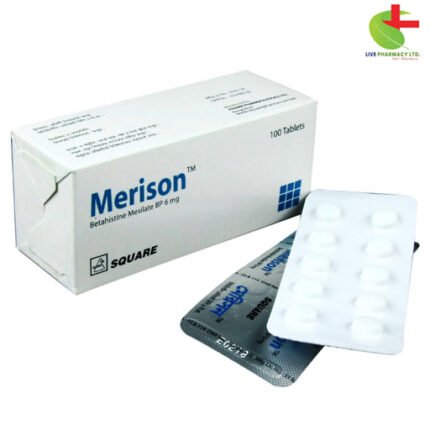Bisocor 2.5
70.00৳ Strip
- Bisocor, a trusted medication for hypertension, angina, and heart failure.
- Contains Bisoprolol Hemifumarate, selectively targeting heart and vascular receptors.
- Once-daily dosing and minimal side effects ensure therapeutic reliability.
- Effective solution for cardiovascular health needs.
 Brand
Brand
|
Square Pharmaceuticals PLC |
|---|---|
 Generics
Generics
|
Bisoprolol Hemifumarate |
Indications
Bisocor serves as a valuable treatment for:
- Hypertension
- Angina
- Moderate to severe heart failure
Please note, it’s not advised for managing hypertensive crises.
Pharmacology
Bisoprolol Hemifumarate stands out as a highly selective ß1 blocker, demonstrating superior affinity for the ß1 receptor compared to other beta-blockers. By selectively blocking the ß1 adrenergic receptor in both the heart and vascular smooth muscle, it effectively reduces heart rate and cardiac output, leading to a decrease in arterial hypertension. Unlike non-ß1 selective ß1-blockers, Bisoprolol doesn’t alter cholesterol fractions, including the cardioprotective HDL-cholesterol, during long-term therapy.
Its pharmacokinetic profile enables once-daily dosing, ensuring minimal variation in plasma concentration profiles and enhancing therapeutic reliability.
Dosage & Administration
For adults treating mild to moderate hypertension, the initial dose typically starts at 5 mg once daily, either as monotherapy or alongside a diuretic. If necessary, the dose can be titrated up to 10 mg and then up to 20 mg daily at intervals of 2 weeks. Further increments beyond 20 mg daily offer marginal benefits.
Safety and efficacy haven’t been established for children. In patients with renal or hepatic impairment, cautious dosing adjustments are recommended.
Interaction
Avoid combining Bisocor fumarate with other β-blocking agents. Close monitoring is advisable when co-administering with catecholamine-depleting drugs or centrally active antihypertensive agents.
Contraindications
Bisocor fumarate is contraindicated in patients with cardiogenic shock, overt heart failure, second or third-degree A-V block, right ventricular failure secondary to pulmonary hypertension, or sinus bradycardia.
Side Effects
Potential side effects associated with Bisocor include fatigue, dizziness, headache, gastrointestinal disturbances, cold extremities, muscle weakness or cramps, and breathing difficulties, especially in patients with asthma or COPD.
Pregnancy & Lactation
Use during pregnancy should be considered only if the potential benefit justifies the potential risk to the fetus. It’s not known if Bisocor is excreted in human milk, so caution is advised for lactating mothers.
Precautions & Warnings
Exercise caution in adjusting Bisocor doses for patients with impaired renal or hepatic function. Patients with a history of severe anaphylactic reactions may exhibit increased sensitivity to allergens.
Common Questions about Bisocor 2.5 mg Tablet
- Usage: Bisocor 2.5 mg Tablet helps manage high blood pressure, angina, and heart failure by slowing heart rate and widening blood vessels.
- Administration: It’s best taken orally once daily, with or without food, preferably at the same time each day.
- Side Effects: Possible side effects include dizziness, fatigue, headache, slow heart rate, breathing difficulties, and cold extremities.
- Safety: While generally safe, consult your doctor before use, especially if you have asthma, diabetes, heart, liver, or kidney issues, low blood pressure, or depression.
- Usage with Food: Take Bisocor 2.5 mg Tablet after food, as prescribed.
- Storage & Disposal: Keep it in a cool, dry place, away from children and pets.
Quick Tips
- Beware of dizziness; rise slowly from sitting or lying positions.
- Monitor blood sugar levels regularly if you’re diabetic.
- Avoid abrupt cessation to prevent sudden rises in blood pressure, reducing the risk of heart attack and stroke.













Reviews
There are no reviews yet.